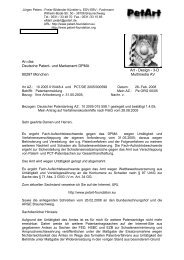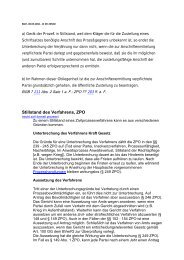Soziologische Vorüberlegungen zu einer europäischen Küstenwache
Soziologische Vorüberlegungen zu einer europäischen Küstenwache
Soziologische Vorüberlegungen zu einer europäischen Küstenwache
Erfolgreiche ePaper selbst erstellen
Machen Sie aus Ihren PDF Publikationen ein blätterbares Flipbook mit unserer einzigartigen Google optimierten e-Paper Software.
Abstract<br />
Because of the average of the freighter PALLAS in October 1998 having shown some structural<br />
weaknesses not only in Germany, this essay shall present options for a better coast guard. Almost<br />
the same problems as in the average of the PALLAS can be seen in the havoc caused by the average<br />
of the tanker ERIKA in December 1999 or, only after the average of the tanker PRESTIGE in<br />
Spanish waters in November 2002. After each occurrence you can hear the demands for a better<br />
coast guard, respectively for more severe laws. Hence, a solution seams necessary.<br />
With regard to a solution there are many difficulties, which – followed Ralf Dahrendorf´s theory<br />
of class-conflict – can be classified in three levels of conflict. The first level called “the first conflict”<br />
or “conflict by water” is a consequence of the “freedom of the seas”. Keywords for this<br />
practice are “cranky boats” or “one-ship-companies”. The next level called “the second conflict”<br />
or “conflict by land” can be divided in two parts. On the one hand there is the difficulty that<br />
some political actors have objections to some innovations. On the over hand there are the different<br />
structures of coast guards in each country of the EC. At least there is the so called “third conflict”<br />
or “conflict by justice” referring to the laws and the third-party-insurance.<br />
The maximum aim may be a European Coastguard under direct sovereignty of the European<br />
Commission named in this essay MARES (Maritime Agency for Rescue on the European Seas).<br />
This way seems to be the most comprehensive solution to improve the status-quo. Further to<br />
this there are less fundamental solutions conceivable, but I consider MARES as an authority of<br />
the EC. Actually, I think there are some interesting ideas planned by the European Commission,<br />
which may be suitable for solving some of the present problems. However, MARES could only<br />
reduce respectively regulate the consequences of the “conflict by water”, which would be an improvement<br />
as against the status-quo. Meanwhile, solving this fundamental conflict itself is a task<br />
for the IMO, for example, by changing the international maritime law.<br />
It may be helpful to keep all this in mind. Future must show which way of protection we might<br />
obtain as a consequence of average of ships.
















